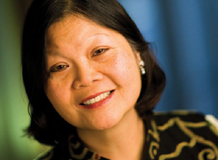
Carolyn Y. Woo, Martin J. Gillen Dean and Ray and Milann Siegfried Chair in Entrepreneurial Studies at the University of Notre Dame’s Mendoza College of Business, was a presenter at the first Global Forum for Responsible Management Education, held Dec. 4 and 5 at the United Nations headquarters in New York City.
In her remarks during an address to U.N. Secretary-General Ban Ki-moon as part of the global forum, Woo urged attendees to refocus business education away from a too-narrow agenda of wealth-creation for owners only to a broader perspective considering the role of business in solving the pressing global issues of poverty, disease and conflict.
“In subtle but undeniable ways, through our focus and content, we have let our students walk away from the bigger picture and the big responsibilities,”Woo said.“As we go forward, let it not be our negligence that we continue to foster an attitude of disconnectedness from the common good, a disconnectedness that sows the seeds of unbridled self-interest.”
Attended by senior administrators from more than 150 academic institutions around the world, the forum provided a platform to advance the concept of corporate responsibility and sustainability in management education.
At the close of her address, Woo also requested of the secretary-general two hours of programming time to further engage business school deans on this message. Immediately after the conference, Ban sent word to the dean that her request was granted.
The forum in particular centered on the Principles for Responsible Management Education (PRME), a U.N.-backed global initiative developed to promote corporate responsibility and sustainability in business education. Woo spearheaded an international task force of 60 deans, university presidents and official representatives of leading business schools who developed the initiative, which was launched under the patronage of Ban in July 2007.
Participating institutions, including the Mendoza College, make a commitment to align their mission and strategy, as well as their core competencies ñ education, research and thought leadership ñ with U.N. values embodied by the six PRME principles. Actions encouraged under the initiative’s framework include curriculum development around the corporate responsibility agenda and research in support of sustainable management systems, as well as public advocacy and opinion leadership to advance responsible business practices. Currently, more than 175 business schools have endorsed the initiative.
PRME is part of the U.N. Global Compact, a strategic policy initiative for businesses that are committed to aligning their operations and strategies with 10 universally accepted principles in the areas of human rights, labor, environment and anti-corruption.
“PRME is an important counterpoint to the direction that business education has taken over the last 60 years,”said Woo, who added that the current analytical framework often turns human endeavors into competitive battles that glorify a winner-take-all mentality. In contrast, she described how PRME and the U.N. Global Compact re-orders priorities, shifting attention to the fundamental canons of human communities.
“First, human rights takes precedence over all other interests. As such, economic enterprises must serve people and uphold these rights, not the other way around,”Woo said.“Second, as a community, by definition, we flourish and advance collectively, not individually.”This last point calls for"mutuality,"a balance between what a person or organization takes and what is given back.
Woo said the Global Compact and PRME initiatives will allow business educators to better broaden the students’ visions.
“Let us use this opportunity to inspire our students, to enable them to see how they and business can become solutions to issues as big as poverty and peace, and as routine as a safe work environment, the promotion of a worker, a pay-day with something left over for savings,”Woo said.
Other forum participants from the Mendoza College included Rev. Oliver F. Williams, C.S.C., associate professor of management and director of the Global Compact Foundation, and Viva O. Bartkus, associate professor of management. Woo chaired a session on curriculum change in addition to speaking during the concluding session.
More information about the PRME, including a listing of the principles, are available on the Web at www.unprme.org .
TopicID: 30708